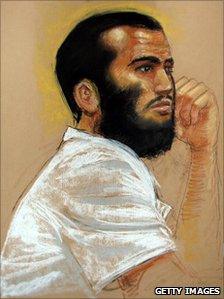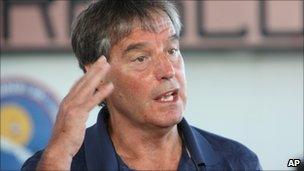Omar Khadr: What lies ahead for Canadian militant?
- Published

Now 24, Khadr has spent a third of his life in US custody
Convicted militant Omar Khadr has been sentenced to 40 years in prison by a US military tribunal at Guantanamo Bay, after his capture by US forces in Afghanistan in 2002. However, he will serve only eight years under a plea deal.
The BBC's Bill Law, who reported on Islamist extremism in Canada for a 2008 Crossing Continents documentary, says that on his eventual release, the former child soldier will have two paths from which to choose.
Omar Khadr was just 15 when he was wounded and captured on a battlefield in Afghanistan. He was interrogated at the notorious Bagram prison before being shipped to the US detention centre in Guantanamo Bay, Cuba, where he has been held on charges of killing an American soldier - the youngest inmate there.
And although he is a Canadian citizen, the Canadian government has steadfastly declined to become involved in his case, setting it apart from every other Western government that had nationals detained at Guantanamo Bay.
The Khadrs have been called Canada's "first family of terror".
Omar Khadr's father, an associate of Osama Bin Laden, took the family to Peshawar, in Pakistan, to support the Afghan mujahideen in their war against the Soviets when Khadr was a child. The father died in a firefight with Pakistani troops near the Afghan border in 2003.
One brother is paralysed from the waist down after being wounded in that same battle. Another has just been released from jail in Toronto after successfully fighting extradition to the US on terror charges.
Omar Khadr's sister Zaynab and mother Maha are notorious in Canada for their extremist views.
Zaynab Khadr, 31, refuses to condemn terror attacks like the London bombings of 2005.
"Pain is pain," she told me in 2008. "It is up to God to judge those people."
Still, the majority of Canadians support the campaign to repatriate Omar Khadr, now 24. He is, after all, the only citizen of a Western country still held at Guantanamo Bay.
Nazim Baksh, a reporter for the Canadian Broadcasting Corporation and an expert on Islamist extremism, says Khadr was always pleasant when he saw him in the court room during his several visits to Guantanamo to report on the case.
"He's a big guy, 6ft 3in with a full beard," Mr Baksh tells me. "He'd be wakened at 0330 for an 0900 hearing. Sometimes he'd refuse to go, other times he'd be sleepy sitting in the courtroom, just like any kid."
Choices ahead
Under the plea deal, Khadr is expected to be sent to Canada after serving one year at Guantanamo Bay.

Lawyer Dennis Edney says he hopes Omar Khadr will be able to reintegrate into society
Mr Baksh says that Khadr has two choices when he returns to Canada: he can become a folk hero to radical Islamists and serve the cause that his mother and sister espoused, or he can take the route of his elder brother Abdurahman Khadr, who refused to join jihad.
Recently married, Abdurahman Khadr lives a quiet, ordinary life and works in Toronto.
Dennis Edney, Omar Khadr's Canadian lawyer, insists that his client is a "wonderful young man, despite the horrors he has experienced".
He says: "There is no sense of rage. I have spoken to him about his family and he is well aware of the potential [damage] of their behaviour."
Speaking from Guantanamo, Mr Edney tells me of a plan that will see Omar Khadr living away from his family and going to a small, Christian university in the Canadian province of Alberta.
He says he is hopeful that his client can live a normal life but acknowledges he may be underestimating the difficulties Khadr will face reintegrating back into society.
Extreme ideology
Nazim Baksh says that Canadians are split on the Khadr case. Many still consider him and some members of his family a threat, while others see him as a child victim of both an extreme Islamist ideology and cruel and unusual treatment at the hands of his American jailers.
A recent poll commissioned by the Globe and Mail newspaper showed 64% would be happy to have Khadr serve part of his prison sentence in Canada.
And with Canada's more generous parole system, where prisoners are routinely released after serving one-third of their sentence, he could be out very soon.
But the question still remains: what road will the youngest inmate held in Guantanamo take once he returns to his native land, his mother and sister's, or the one his lawyer and his elder brother Abdurahman want him to follow?
Bill Law reported and produced BBC Radio 4 documentary Crossing Continents: Islam and Canada, external, broadcast on Thursday, 18 November, 2008.
- Published27 October 2010
- Published29 September 2012
- Published25 October 2010
- Published5 August 2010